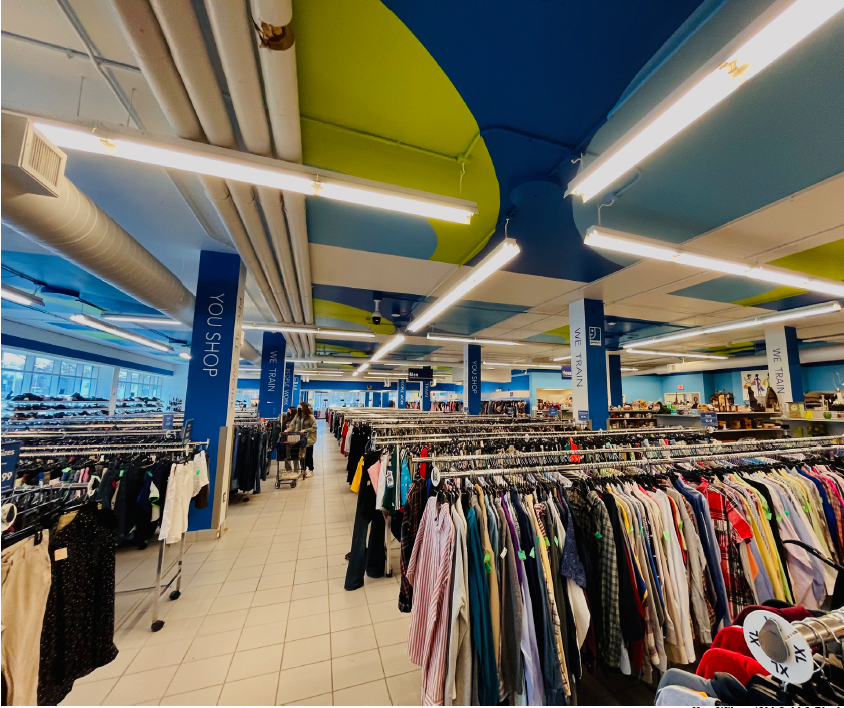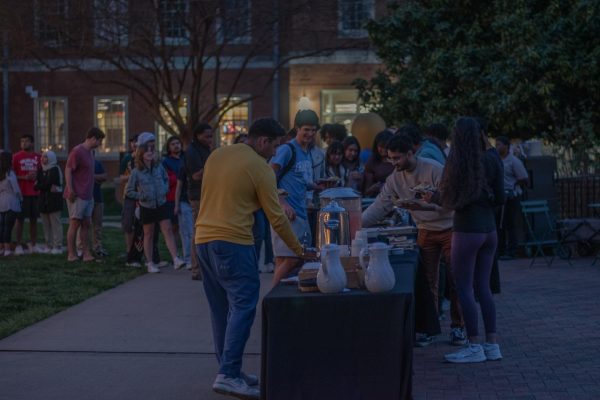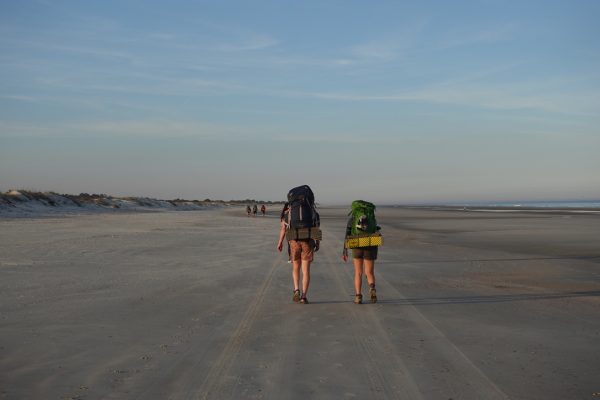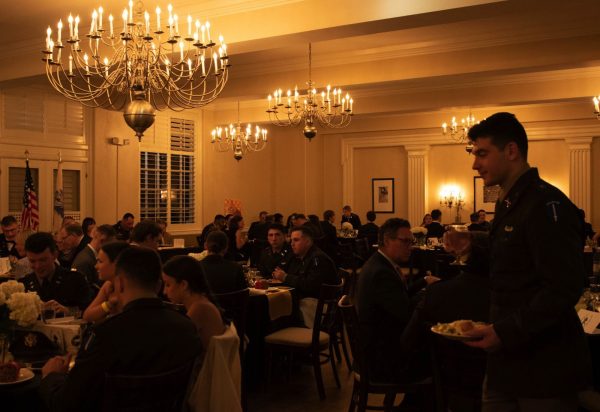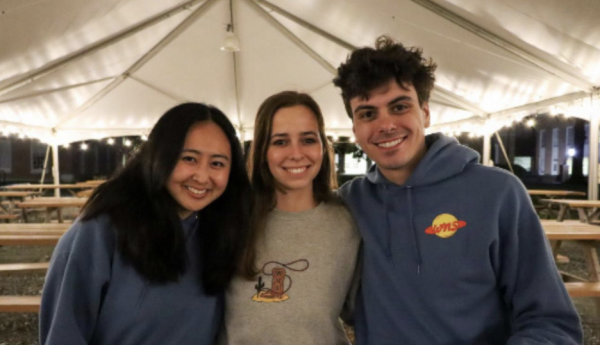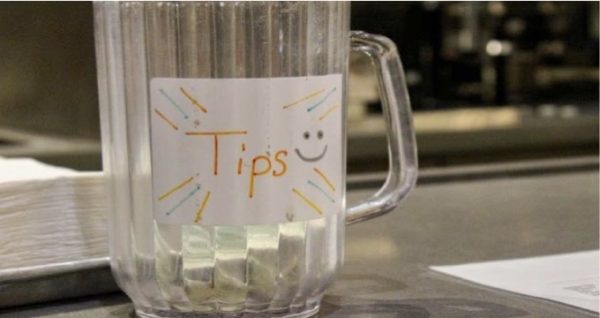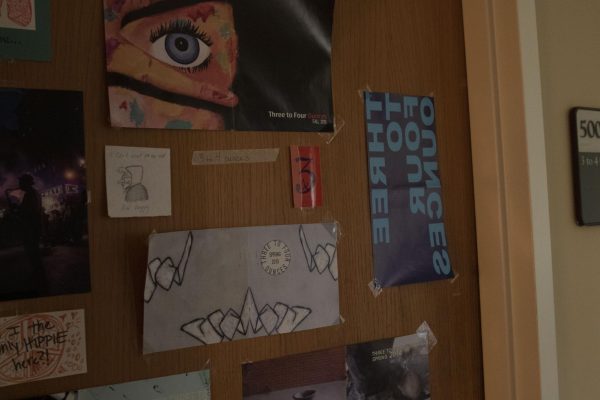Mindful fashion: Think before you thrift
Wake Forest students look beneath the surface of the new surge in thrifting culture
As many Wake Forest students shop at the Goodwill on University Parkway, being respectful of the surrounding community members keeps the practice inclusive to all.
January 28, 2022
For many college students, thrifting is the pinnacle of sustainable, ethical and affordable shopping. However, as the practice has grown in popularity, concerns are rising over whether thrifting has become less inclusive to the people who shop secondhand out of necessity.
Thrifting clothes instead of buying them from popular clothing brands can have a significant impact on the environment when done mindfully. Though participating in thrifting is no cure for general overconsumption, it is more environmentally friendly than shopping only from big-name brands that may not adequately regulate the effects of product production. Retail companies such as Shein, Zara and H&M sell trendy clothing items for very low prices, making their products extremely appealing to the consumer. In order to make their clothes so quickly and affordably, however, many of these corporations rely on cheap, unethical labor in places like China or Spain, and as a result, create immense ecological damage, according to the Fashion Transparency Index.
Mainstream clothing brands contributing to this production model, known as ‘fast fashion’, produce 10% of all of humanity’s global carbon emissions, according to Business Insider. The fast fashion industry is also the second-largest consumer of the world’s water supply and pollutes the oceans with microplastics, which can be damaging to global ecosystems.
Alyse Harris, sophomore, is the president of Wayward Fashion, a sustainable fashion club at Wake Forest. She enjoys thrifting for personal and environmental reasons, and wanted to share that passion with more people at Wake Forest.
“When you buy second-hand, you’re slowing down the cycle of clothing going from stores to people to landfills,” Harris said. “For me, it’s an amazing way to spend time with my friends and also find really unique clothing items that I get to give a whole second life to.”
For all its environmental and economical benefits, however, there is rising concern about the surge of affluent consumers in the thrifting market. Oftentimes, thrift stores like Goodwill and Mega Thrift are the only affordable options for lower-income shoppers.
When shopping at thrift stores such as these, Harris says, it is important to be mindful of the community you are buying clothes from.
“I think the real danger in unethical thrifting comes from ‘thrift hauls’, where people just fill a shopping cart with clothes because they’re so cheap,” Harris said. “It brings a sense of worthlessness to the clothes, which is a harmful mindset, and it’s just disrespectful to the people shopping there out of need.”
Harris says that when she thrifts, she brings only a small backpack with her that she can carry her purchases in — usually only five or six items. She also donates the same amount of clothes that she buys back to the thrift store.
“It makes the cycle more fluid to me,” Harris said. “I give back one piece for every one that I take, so that way I’m not draining the community of its resources and I can still build my wardrobe of beautiful secondhand items.”
Since graduating from Wake Forest in 2021, Riley Phillips has continued to run Finders Keepers, the podcast and secondhand clothing business she started with her friend, Meredith Vaughn, while they were still students. Buying clothing from thrift stores to sell for profit in her business is something Phillips always tries to do with mindful and ethical principles.
“Meredith and I hold each other accountable for being super careful about what we take from community thrift stores,” Phillips said. “We never take children’s clothes, underwear, or barely used outerwear, and we generally like to buy clothes that are damaged in some way so that I can fix them with my sewing machine.”
The Goodwill Outlet Store on Peters Creek Parkway offers clothing to purchase at a reduced price from large bins of items. Phillips frequently visits the bins to find clothing for Finders Keepers because of their policy for clothes that don’t get sold.
“Unlike other Goodwill stores, anything that isn’t bought at the bins goes straight to the landfill at the end of the day,” Phillips said. “Even though I feel better knowing that whatever I buy is technically being saved from the trash, I still only purchase a small handful of items, just so that I am not taking too much from someone who might have actually needed it.”
Both Phillips and Harris agree, while thrifting is a great way to shop sustainably, it is important to be mindful of how much you are buying, what community you are taking the clothes from and whether or not you will actually wear the item.
“These days when I go thrifting, I am working on creating my eternal closet.” Harris said. “I keep building on my wardrobe items that are, say, made of really high quality fabric, or go with so many other pieces in my closet — those are the ones I know I’ll keep forever.”
Phillips has a similar outlook. “I like to buy items that I know will work with at least ten to fifteen outfits, so that I can extend the longevity of that clothing’s lifespan.” Phillips said. “Trying the clothes on in the store, or even bringing a tape measure with you to make sure what you’re getting fits can help minimize buying things only to throw them out in the end.”
Wayward Fashion can be found on Instagram at @waywardfashion.wf. The Finders Keepers podcast can be accessed from all podcast listening services, and the shop is located in Design Archives in downtown Winston-Salem on Fourth Street. Their Instagram page is @finderskeeperspod.


